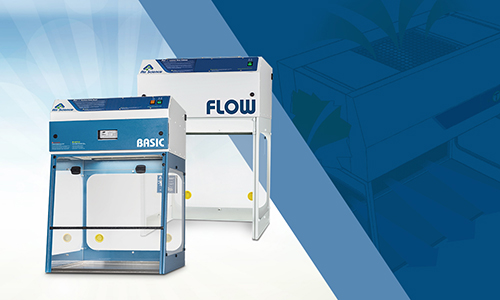
Air Science® laminar flow hoods and ductless fume hoods are designed to be installed almost anywhere without added installation costs. They are easy to operate, economical, and environmentally friendly.
When it comes to choosing between laminar flow hoods or our ductless fume hoods, however, there are several key differences to consider.
Laminar Flow Hoods
Laminar flow hoods are primarily used to protect work or equipment on the work surface from particulate contamination. The word ‘laminar’ means non-turbulent or taking place along a constant streamline. Laminar flow hoods achieve this through either horizontal or vertical airflow. This unidirectional air stream moves at a controlled speed that eliminates airflow swirls or turbulence that could create uncontrolled results.
Key Features
- Provides particulate protection for items on the work surface
- Ideal for non-hazardous applications
- Optional UV lamp provides safe decontamination
Ductless Fume Hoods
Our ductless fume hoods are designed for high efficiency and flexibility. Ductless technology relies on activated carbon filters that clean contaminated air and recirculate it into the laboratory. This means no additional ductwork is required and conditioned room air is not externally vented, making ducted fume hoods energy efficient and eco-friendly.
Benefits
- Protects the user and the environment
- Captures hazardous vapors generated on the work surface
- With added HEPA/ULPA filter, provides protection from particle hazards
Comparison
Both laminar flow hoods and ductless fume hoods are designed to be installed almost anywhere without added installation costs. They are easy to operate, economical, and environmentally friendly.
The biggest difference between the two lies in what they protect – laminar flow hoods protect your work from particulates while ductless fume hoods protect you from vapors and particulates when HEPA filters are used.
Resources

Ductless versus Ducted Venting Options

Horizontal or Vertical Laminar Flow: Which is best for your application?

Equipment Selection Guide: Choosing the Right Filtration Solutions to Complete Your Laboratory